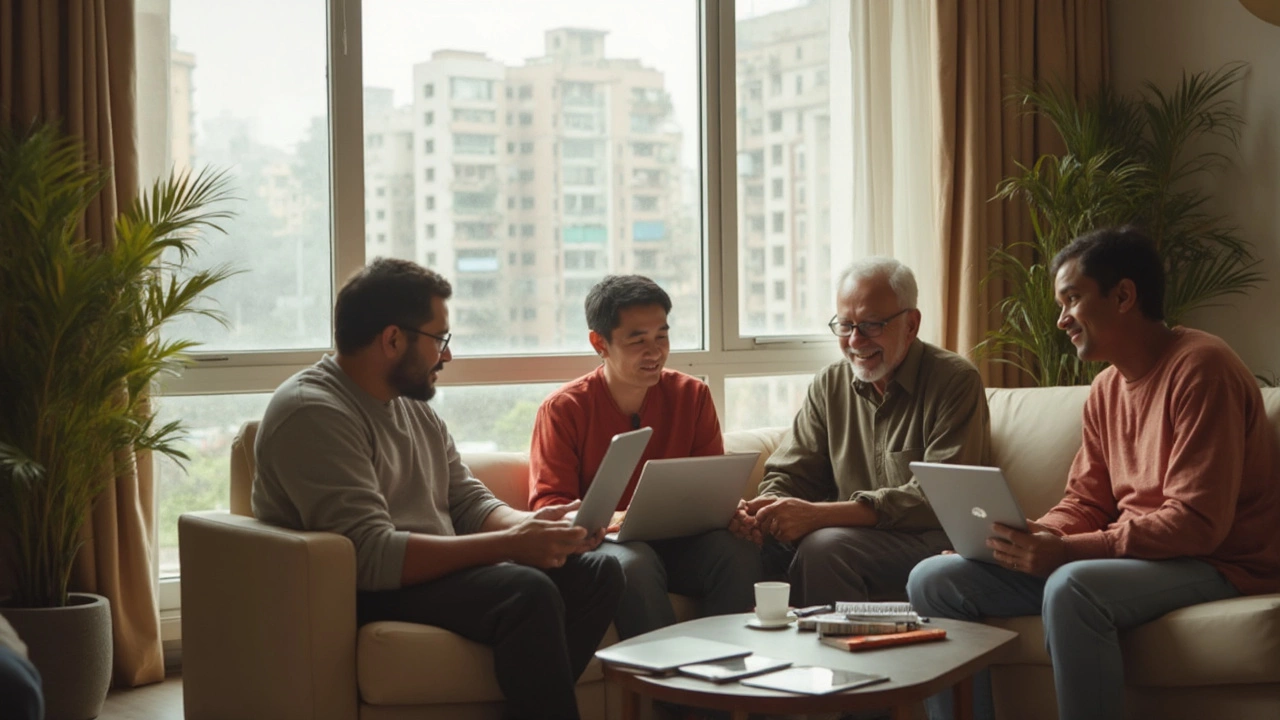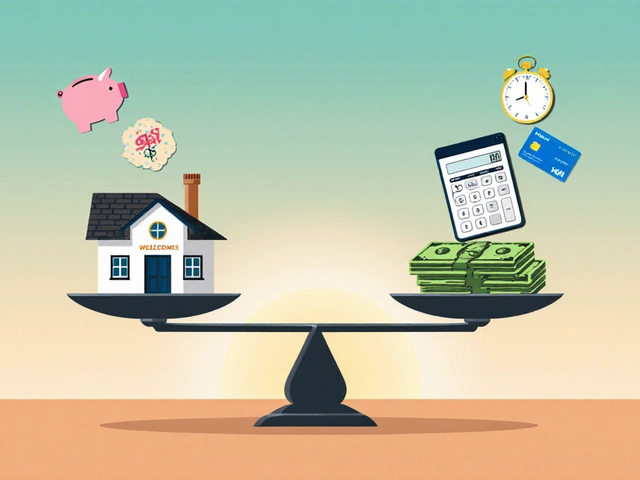You’d be surprised how many places out there nail the sweet spot between easy living and not breaking the bank. Forget the tired lists that keep throwing the same old names at you—there are cities and towns, both in and outside the US, where you can get a nice apartment, grab solid coffee, and maybe even hit a park or nearby beach, all while paying way less than you’d expect.
But what’s the real trick? Zeroing in on what actually matters to you, not just finding the lowest rent. Sure, you want cheap, but you probably also want decent public transport, safe neighborhoods, lots of green space, maybe even a bit of nightlife if that’s your thing. And guess what? Some under-the-radar spots check those boxes, while the so-called "affordable" big cities often hide expensive surprises like sky-high utilities or crazy health insurance.
It’s not just about numbers—it’s about lifestyle. Want markets within walking distance? Good local food? Fast internet for remote work? The right places exist, but you need to know how to find them. That’s what you’ll learn here: how to pick a spot that’s honestly nice, really cheap, and actually fits what you care about day-to-day.
- Why Affordable Doesn’t Have to Mean Boring
- What Actually Makes a Place Nice and Cheap?
- Surprising Places Where Your Money Goes Further
- How to Spot Hidden Costs (and Avoid Traps)
- Quick Tips for Making the Most of a Cheap Move
Why Affordable Doesn’t Have to Mean Boring
There’s a stubborn myth that cheap places to live are full of empty streets and nothing fun to do. That’s just not true. Some of the world’s most interesting cities and towns actually have a low cost of living. It’s about knowing where to look, not just picking the first name on a list.
Take Budapest, for example. Rent for a solid one-bedroom can run under $600 a month, yet you’re surrounded by historic baths, funky bars, open-air markets, and parks overlooking the Danube. Or check out Chiang Mai in Thailand, a hotspot for digital nomads and retirees, where you can get a modern apartment, eat out daily, and get high-speed internet for less than half what you’d pay in most US cities.
Even in the US, there are cities like Tulsa, Oklahoma, that have started programs actually paying newcomers to move there. With median rent around $900, fast-growing food scenes, and live music almost every weekend, you won’t be staring at your walls out of boredom.
Here’s a quick comparison of lifestyle basics in a few places that break the boring stereotype:
| City | Avg Rent (1 bed/month) | Fun Perks | Monthly Events |
|---|---|---|---|
| Budapest, Hungary | $590 | Thermal baths, ruin pubs, cafés | 40+ |
| Chiang Mai, Thailand | $350 | Food markets, hiking, festivals | 25+ |
| Tulsa, USA | $900 | River trails, live music, tech events | 35+ |
So, next time you’re scoping out places that won’t wreck your budget, remember: affordable doesn’t kill your social life or hobbies. In fact, paying less for rent or food can leave you with more money—and more time—to actually enjoy where you live.
What Actually Makes a Place Nice and Cheap?
So what sets apart a spot that’s just cheap from one that’s both cheap and genuinely good to live in? There’s more to it than rent prices or hotel deals. Let’s cut through the fluff and dig into what actually matters.
- Affordable housing is only part of the equation. You want a place where rent is predictable, and you’re not getting smacked by random fees. Cities like Krakow, Chiang Mai, or Tbilisi have become popular because you can get a well-located apartment for under $400-600 a month, utilities included.
- Access to public services is a big deal. Check if buses and trains run often and cost little. In Porto, Portugal, for example, a monthly local transit pass runs about €40. These things add up fast if you’re not careful.
- Healthcare costs can easily surprise you. In countries like Mexico, Thailand, or Portugal, a routine doctor visit is often $20-50 out of pocket, compared to $100+ in the US if you’re uninsured.
- Quality of life perks—think parks, gyms, safe streets, good cafes—aren’t just extras. They’re the stuff that lets you actually enjoy living cheaply. Belgrade, Serbia is known for coffee shop culture and riverside parks, all free to enjoy.
- Diversity of jobs and community events matter too. You don’t want to land somewhere cheap but dead boring. Medellín, Colombia, for instance, packs coworking spaces, food markets, and music fests into a pretty compact urban area.
To get a sense of how these things stack up, check out this quick comparison of typical monthly base costs in a few favorite cities:
| City | 1-Bed Apartment | Monthly Transit Pass | Groceries (1 Person) | Healthcare Visit |
|---|---|---|---|---|
| Budapest, Hungary | $550 | $30 | $160 | $40 |
| Chiang Mai, Thailand | $340 | $22 | $120 | $25 |
| Porto, Portugal | $650 | $43 | $170 | $50 |
| Santa Fe, New Mexico | $900 | $38 | $250 | $120 |
What’s the takeaway? Always go beyond just rent—add up the other everyday costs. Run the math for public transport, groceries, and basic healthcare before picking a spot. This way, you won’t get caught by hidden expenses in your next "affordable" move.

Surprising Places Where Your Money Goes Further
Everyone hears about big-name cities like Austin or Berlin, but plenty of less-hyped places offer real deals for quality living. These are spots where the rent is manageable, daily stuff doesn’t eat up your paycheck, and life just feels more chilled out. Here are a few that keep popping up in recent stats and real-world stories:
- Da Nang, Vietnam: Rent for a solid one-bedroom runs under $300 a month. This is with fast internet, walkable neighborhoods, and beaches you’d actually want to hang out on. Street food? Cheap and tasty—think $2 for a big bowl of noodles.
- Oaxaca, Mexico: It’s not just for tourists. Rent for a decent apartment sits around $400, local markets are packed with fresh produce, and healthcare is shockingly affordable even without insurance. The vibe is social without being chaotic.
- Tbilisi, Georgia: The country, not the state. You get stunning old city vibes, awesome mountain views, and monthly living costs—for rent and everything else—rarely crawl past $800. The country’s visa policy is friendly to remote workers, too.
- Valencia, Spain: While bigger cities in Spain get pricey fast, Valencia keeps things reasonable. Good public transport, bike-friendly streets, and plenty of outdoor cafes. Single apartments can hover near $650, and groceries are way cheaper than northern Europe or the US.
- Krakow, Poland: You’ll find gorgeous parks, solid public transport, and a lively food scene. Rent for a central apartment often falls between $500 and $700. That’s enough wiggle room for dinners out or weekend trips to neighboring countries by cheap bus or train.
Ever compare numbers? Here’s how these places stack up against common big-city favorites. Look at the difference in total monthly living costs:
| City | Average 1-Bedroom Rent (USD) | Average Monthly Living Cost (USD, Single Person) |
|---|---|---|
| Da Nang, Vietnam | $280 | $720 |
| Oaxaca, Mexico | $400 | $950 |
| Tbilisi, Georgia | $350 | $850 |
| Valencia, Spain | $650 | $1,300 |
| Krakow, Poland | $600 | $1,100 |
| Austin, TX (for comparison) | $1,650 | $2,750 |
Notice how the affordable housing options in these countries let you keep more cash for travel, hobbies, or saving up. The basics—rent, groceries, transport—are significantly less than big U.S. or Western European cities, but day-to-day comfort doesn’t take a hit. If you’re remote working or just looking for a change, checking out these underrated places could mean bigger living for less.
How to Spot Hidden Costs (and Avoid Traps)
Low rent can look like a steal, but lots of cities and towns have sneaky expenses waiting to catch newcomers off guard. If you want your budget to stretch, you need to know exactly what to check before signing a lease or booking that moving truck.
Start with utilities. Sometimes, an apartment’s rent is cheap because you’ll get nailed with huge heating or cooling bills every month—the Northeast US is notorious for this in winter, while parts of the South crank AC costs through the roof in summer. Ask for the average monthly utility bill from the last tenant or landlord. If you’re moving abroad, double-check what’s usually included. In some European cities, "all bills included" is common, while in Southeast Asia, electricity is often separate and can add up fast.
Transportation is another big one. Public transit might sound good on paper, but are schedules practical for your actual daily life? Are you looking at $30 per month or closer to $120? Plus, in smaller towns, you might end up needing a car even if rent is dirt cheap. That means insurance, fuel, parking, maybe even repairs.
Healthcare’s another hidden landmine. If you’re in the US, be ready for monthly premiums, urgent care fees, and possible out-of-network surprises even in affordable areas. In places like Mexico or Portugal, you’ll save big if you can use public health options, but you might still want private insurance for peace of mind.
Don’t forget taxes and local fees. Things like city taxes, trash collection or even parking permits can sneak into your monthly bills. A few spots in Texas and Florida offer low property tax for homeowners but get you with high sales tax or random municipal charges. In Eastern Europe, tourist cities sometimes slap longer-term residents with "tourist taxes" until you prove you live there.
- Always ask for a full breakdown of monthly costs before committing to a place. Landlords and agents should be able to give you a rundown beyond just rent, including utilities and any condo or building fees.
- Check internet quality and price. Fast Wi-Fi isn’t universal—some "cheap" areas charge a premium for high-speed access.
- If you’re moving outside your home country, scan expat forums or local Facebook groups. People will tell you what the real living expenses are with zero sugar-coating.
- Look up grocery and dining prices. Try sites like Numbeo for cost comparisons, but message real people in the area if you want accurate numbers on eating out, produce, and essentials.
That’s how you keep your affordable housing plans from blowing up your wallet. No one likes last-minute surprises, so do your homework and keep those hidden costs from sneaking up on you.

Quick Tips for Making the Most of a Cheap Move
Moving somewhere cheaper sounds easy on paper, but the little details can make or break how much you actually save and how good life feels in your new spot. People who get it right usually follow just a few smart moves from the start.
- Affordable housing usually goes fast. Start searching on local Facebook groups, Craigslist, or specialized local rental sites at least two months before you plan to move. Always check if utilities are included in rent—sometimes a “cheap” place isn’t that cheap once you add electricity, heating, and internet.
- Test drive the neighborhood before you sign anything. If you can, book a weeklong Airbnb or short-term stay in the area you’re eyeing. This gives you a feel for noise, real safety, shops, and how long it actually takes to get to work or school.
- Look for public transport passes or bike share programs. In smaller cities, monthly transit can be way less than owning a car. For example, in Porto, Portugal, a full-month bus and metro pass runs about $45—as opposed to $100+ in most US cities.
- Try local food markets and mom-and-pop stores. Chain supermarkets aren’t always cheaper. In Mexico City, people shave 25% off their grocery bill shopping at open-air markets compared to big box stores.
- Don’t forget about healthcare and paperwork. Research walk-in clinics, expat-friendly banks, and any city-specific fees you might hit (some European cities require a small residency registration fee, for example).
It actually helps to break your costs down so you know what you’re really facing. Here's a quick comparison:
| City | Avg. Rent (1BR central) | Monthly Transit Pass | Utilities (basic) | Groceries (person/week) |
|---|---|---|---|---|
| Chiang Mai, Thailand | $320 | $30 | $60 | $25 |
| Oaxaca, Mexico | $420 | $18 | $55 | $20 |
| Bucharest, Romania | $550 | $18 | $75 | $28 |
| Greenville, SC, USA | $990 | $35 | $130 | $45 |
Tip: Talk to neighbors—they usually know which bills are legit and which are scams, and can tip you off to reliable landlords or the best deals on utilities and internet. Once you land, join local online groups for fast answers about anything from furniture to paperwork quirks. The right info honestly saves you more cash than endless budgeting apps.





